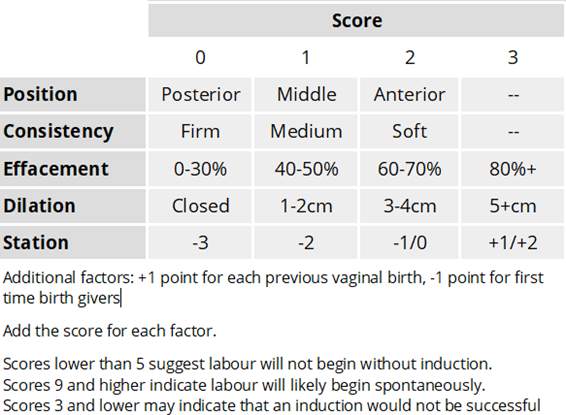Readiness for induction of labor is assessed by determining the:
Apgar score
Bishop score
Biophysical profile
Fetal position
The Correct Answer is B
The readiness for induction of labor is assessed by determining the Bishop score. The Bishop score is a system used to evaluate the cervix for induction of labor readiness. It is based on the assessment of five factors: cervical dilation, cervical effacement, cervical consistency, cervical position, and fetal station. Each factor is scored on a scale of 0 to 3, with a maximum possible score of 15.
The higher the Bishop score, the more favorable the cervix is for induction of labor, and the higher the likelihood of a successful vaginal delivery. A Bishop score of 8 or higher is considered favorable for induction of labor. A low Bishop score may indicate that the cervix is not yet ripe and may need further cervical ripening before induction can be attempted.

The Apgar score is a test used to evaluate a newborn's physical condition at birth, based on five factors: appearance, pulse, grimace, activity, and respiration.
The biophysical profile is a prenatal ultrasound evaluation that assesses fetal well-being by evaluating fetal breathing, fetal movement, fetal tone, amniotic fluid volume, and fetal heart rate. Fetal position is an important consideration during labor, as it can impact the progression and outcome of labor, but it is not used to assess readiness for induction of labor.
Nursing Test Bank
Naxlex Comprehensive Predictor Exams
Related Questions
Correct Answer is C
Explanation
Betamethasone is a corticosteroid that enhances fetal lung maturity, which can help reduce the risk of respiratory distress syndrome and other complications in preterm infants. It does not reduce maternal and fetal tachycardia associated with terbutaline administration, suppress uterine contractions, or maintain maternal respiratory effort and ventilation during magnesium sulfate therapy.
Correct Answer is B
Explanation
The most accurate definition of preterm and post-term infants is based on gestational age at birth. Preterm infants are those born before 37 completed weeks of gestation, and post-term infants are those born after 42 completed weeks of gestation, regardless of their size for gestational age at birth.
Whether you are a student looking to ace your exams or a practicing nurse seeking to enhance your expertise , our nursing education contents will empower you with the confidence and competence to make a difference in the lives of patients and become a respected leader in the healthcare field.
Visit Naxlex, invest in your future and unlock endless possibilities with our unparalleled nursing education contents today
Report Wrong Answer on the Current Question
Do you disagree with the answer? If yes, what is your expected answer? Explain.
Kindly be descriptive with the issue you are facing.
